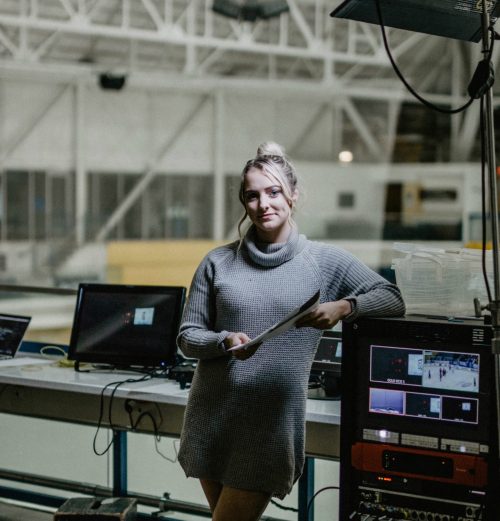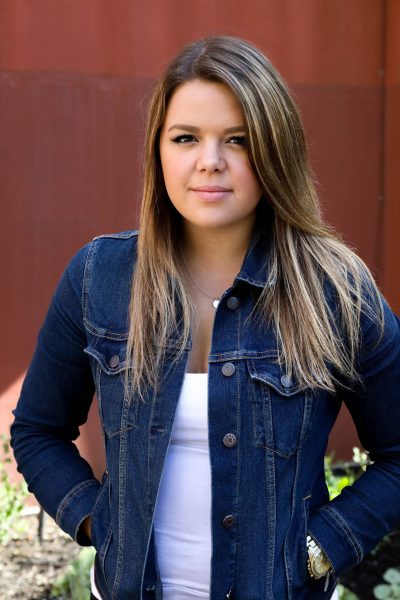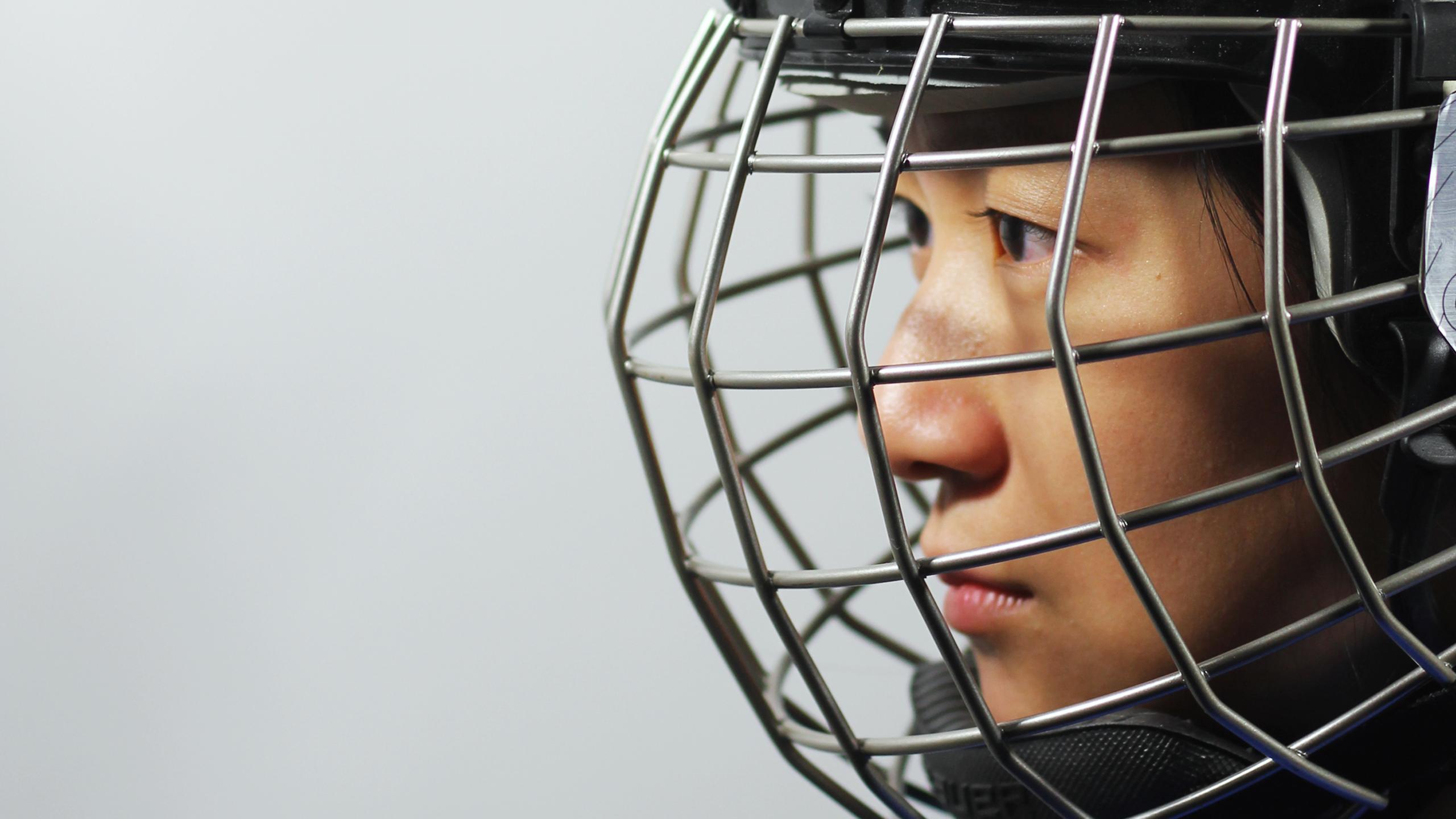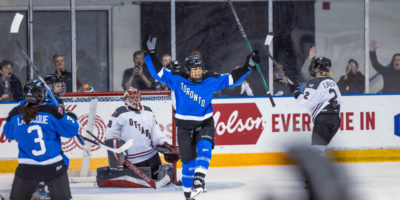By Raneem Alozzi and Sherina Harris
When it comes to sports, it’s not only about the players on the field. Representation in the arena, on the TV, in leadership positions in media organizations and behind the scenes is equally important. Most women in sport media don’t shy away from calling the industry a boys club.
It’s probably not surprising that a 2017 study by the Women’s Media Center found men produce more sports stories than women in America. For women of colour or non-binary people, these statistics are probably even worse. And most research seems to focus on women’s bylines or on-camera appearances, not women in technical, digital or leadership roles.
Although things are getting better—there are more women in certain roles, for example—there are still barriers to women’s participation, both in the classroom, in the control room and in the field. What has happened to get to where we are now? Where is the industry going next?
Past

Karen Sebesta, Senior producer at CBC and assistant professor at Ryerson’s RTA sport media program
When Karen Sebesta left her job at Hockey Night in Canada in the early 2000s, three other individuals had to be rehired to take on her place. The senior producer at CBC Sports leads production of live events internationally and domestically.
Sebesta helped create the RTA sport media program and its curriculum at Ryerson University, when she decided she wanted to come back and teach at her alma mater.
When she first pursued her RTA degree at Ryerson, Sebesta knew she wanted to work in television covering entertainment. But, when the opportunity showed itself, she joined TSN, which she described as a “tiny little sports station” that had just started up at the time.
“I got the job because I didn’t want to work in sports but I wanted television,” she says. “The more I got into it, I began to think this is so amazing. In sports you win or lose, there’s a villain and a hero! News is so depressing.”
Sebesta said she got a lot of opportunities she wouldn’t have gotten otherwise. She worked there for five years, but after a while she felt like she wasn’t learning anything.
Sebesta would go on to work at CBC for the next decade and would cover news and entertainment before returning to cover sports for Hockey Night in Canada.
Moving forward, Sebesta says the industry is changing as equipment and technology becomes more accessible to women. But most importantly, they need to be able to put in the effort and the drive to get the work done.
Present

Maddy Harris, fourth-year sport media student, producer at theScore
It was in her second-year TV lab class that Maddy Harris experienced what she calls a small example of being a woman in sport media. She was partnered up with a male friend for a pitching assignment. When she explained her idea, he said it was good—and then said, “Listen, you’re really outspoken, you’re really aggressive, people don’t like that. Let me pitch the idea.”
At the time, she didn’t recognize why she was so upset by what happened. Now, as a fourth-year sport media student and producer, she sees the double standard.
“Women aren’t afforded the same amount of chances that men are. If you mess up as a woman in sport media, it speaks for all women in sport media,” she says. “You always feel like you’re carrying this weight of this much larger thing, because if you do it wrong, or the girl beside you does it wrong, then guys are gonna be like, ‘This is why we don’t let women produce’ or ‘This is why we don’t let women direct.’”
Harris says she’s in a unique spot, working in both digital and broadcast sport media as a student. She says there’s more women’s representation in broadcast than digital media, and notes the importance of representation in any facet of the industry.
“Some…women have already trailblazed for us,” she says. “If I have someone I can look up to, I can say, ‘She’s who I want to be, I want to emulate some quality of what she does.” Then that gives me a trail to follow.”

Sarah Jenkins, Yahoo! Sports video producer
Sarah Jenkins played competitive hockey her entire life, but never saw sports as a viable career option. It wasn’t until she was applying for university programs that her dad suggested she try sport media at Ryerson, a brand-new program at the time.
She graduated in 2018, and she’s now a video producer at Yahoo! Sports. She’s also the co-chair of the Women’s Inclusion Network at Verizon Media.
“If we can find a way to have those ‘aha moments’ way earlier for young women, knowing especially in high school [they can choose] sports as careers, then it’d be such a game changer,” Jenkins says.
Up until recently, Jenkins was the only woman on her team at Yahoo! Sports. When reviewing job applications, she made an effort to vouch for women.
If she had seen her own job posted online, she wouldn’t have applied. It was only when the chair of her program told her she was the perfect candidate that she decided to apply—and ended up with a full-time job right out of university.
“It’s scary to think I wouldn’t even be in this position if I wouldn’t have had someone push me and give me that extra boost and say, no, you are good enough for this role,” she says.
Jenkins says she wants to see more visibility in the industry.
“It still is totally male dominated. I go to morning skate and I’m way more conscious about what I wear and what I have to look like,” she says.
“I want to get to a place one day where I walk into the Leafs dressing room and I’m not saying, ‘Oh, look, there’s another woman in here today.”











Leave a Reply